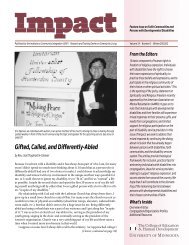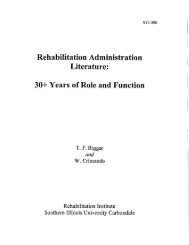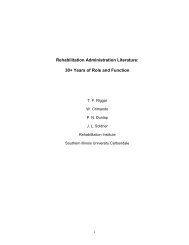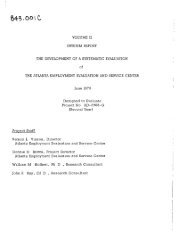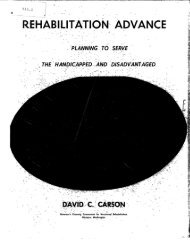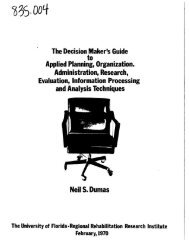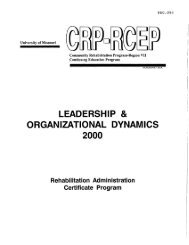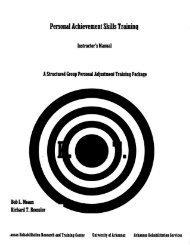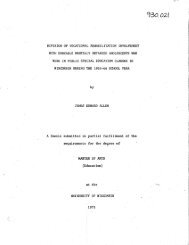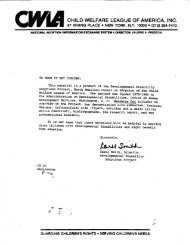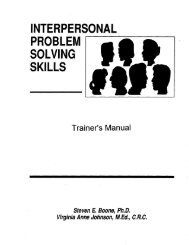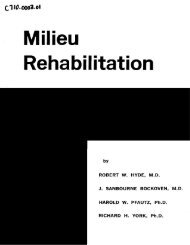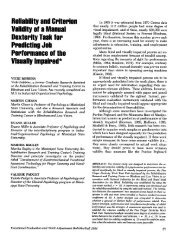Meeting Global Deaf Peers, Visiting Ideal Deaf Places ... - NCRTM
Meeting Global Deaf Peers, Visiting Ideal Deaf Places ... - NCRTM
Meeting Global Deaf Peers, Visiting Ideal Deaf Places ... - NCRTM
You also want an ePaper? Increase the reach of your titles
YUMPU automatically turns print PDFs into web optimized ePapers that Google loves.
DEAF WAYS OF EDUCATION LEADING TO EMPOWERMENT<br />
as in meetings with smaller groups of<br />
research participants at my home.<br />
Grounded analysis is a process.<br />
“Ideas and recommendations which<br />
the research develops and makes<br />
emerge from the data are grounded<br />
in what the key participants have<br />
contributed through their worlds and<br />
experiences” (Goodley, Lawthom,<br />
Clough, & Moore, 2004, p.119). I<br />
coded my research data into categories<br />
(e.g., waking up, circle of deaf<br />
empowerment, deaf cultural rhetoric,<br />
global encounters) and identified relationships<br />
between those categories<br />
(e.g., Flemish deaf people wake up<br />
through informal exchanges of deaf<br />
cultural rhetoric in global encounters<br />
with international empowered deaf<br />
people (Breivik, Haualand, & Solvang,<br />
2002; Murray, in press). That led to<br />
tentative generalizations and theory<br />
development (Leedy & Ormrod, 2003;<br />
Stebbins, 2001).<br />
Study of 15 deaf role models led to<br />
the emergence of three categories distinguishing<br />
different factors leading to<br />
the empowerment of the Flemish deaf<br />
community. In regard to the first place<br />
and earliest time frame (early 1990s),<br />
deaf study participants mentioned participating<br />
in a deaf awareness course,<br />
having contacts with international empowered<br />
deaf people, and visiting ideal<br />
deaf places, or deaf dream worlds.<br />
Concerning the second stage (mid-<br />
1990s), Flemish deaf leaders mentioned<br />
being empowered by hearing<br />
sign language researchers and their information.<br />
In the third stage, the Flemish<br />
deaf community was able to<br />
empower its own people through deaf<br />
activism and collaboration with hearing<br />
allies, a movement that began in<br />
the second half of the 1990s and is still<br />
going on today (De Clerck, 2005). (In<br />
the course of my research, interviews I<br />
conducted in the 2000s with young<br />
deaf people studying abroad in barrierfree<br />
environments revealed experi-<br />
8<br />
ences of empowerment similar to<br />
those experienced by deaf people during<br />
short trips in the 1990s.)<br />
The present article explores the<br />
first stage of Flemish deaf empowerment<br />
and the concepts of visiting deaf<br />
dream worlds and global deaf encounters<br />
that emerged from the data<br />
and categorization of the data (Stebbins,<br />
2001; Strauss & Corbin, 1990).<br />
This will bring up a “new body of<br />
knowledge” on deaf empowerment,<br />
deaf identities, and deaf activism “that<br />
is uniquely grounded” (Goodley et al.,<br />
2004, p. 121) in the life stories of Flemish<br />
deaf people. Life stories illustrate<br />
how “narrators present stories in ways<br />
that accent resilience in adversity as<br />
to maintain a sense of coherence and<br />
personal integrity” (Goodley, 2001,<br />
p. 219, cited in Roets, Reinaart, & Van<br />
Hove, in press). <strong>Deaf</strong> subjectivities<br />
were chained in the meanings that institutions<br />
and hearing society forced<br />
upon them (Goodley et al., 2004), yet<br />
deaf hands, though ignored by hearing<br />
master narratives, never stopped<br />
signing. Discourse analysis can highlight<br />
the “sense of discursive oppression<br />
and resistance” that “runs<br />
throughout the narrative” (Goodley et<br />
al., 2004, p. 101).<br />
To explore this first stage of Flemish<br />
deaf empowerment, I use a montage of<br />
“composed” (Ellis & Bochner, 1996)<br />
ethnographic narratives of deaf empowerment<br />
constructed through narratives<br />
by Edward, Gaby, Ronny, Filip,<br />
and Vincent, the group of research participants<br />
who took the deaf awareness<br />
course set up by the Flemish Federation<br />
of the <strong>Deaf</strong> in 1990 and joined in<br />
study trips abroad between 1992 and<br />
1994. Edward, Gaby, Ronny, Filip, and<br />
Vincent were all born in the 1960s and<br />
have known each other for a long time.<br />
Ethical use of (re)constructed insiders’<br />
perspectives is a legitimate method for<br />
the representation and validation of<br />
qualitative research (Roets et al., 2005).<br />
I combine this life story research with<br />
the historical research of written documents<br />
(Jankowski, 1997). The analysis<br />
of reports of the deaf awareness course<br />
and articles in deaf magazines offer additional<br />
primary sources for the exploration<br />
of Flemish deaf cultural rhetoric.<br />
I translated all interviews from<br />
Flemish Sign Language into Dutch, and<br />
then from Dutch into English. All research<br />
participants read and approved<br />
the Dutch translations of the interviews<br />
presented in my research, and<br />
decided either to be identified or to be<br />
anonymous. Those who preferred not<br />
to be identified asked me to suggest a<br />
name, which they would then approve.<br />
One research participant also asked<br />
me not to indicate gender. Therefore,<br />
gender is not discussed. I eliminated or<br />
changed the names of places, deaf<br />
schools, family structures, etc., to protect<br />
my research participants.<br />
Background of the Study<br />
In September 1990, the Flemish Federation<br />
of the <strong>Deaf</strong>, Fevlado, started a<br />
deaf awareness course, called the<br />
kadercursus.The Flemish/Dutch word<br />
kader means “board,” and cursus is<br />
Dutch for “course.” The deaf awareness<br />
course was originally intended as<br />
a training experience for board members<br />
of the deaf clubs associated with<br />
Fevlado (Buyens, 1990). The purpose<br />
of the course was to generate discussion<br />
of different aspects of the deaf<br />
community in Flanders and draw comparisons<br />
with other countries. (The information<br />
provided here on the<br />
kadercursus is based on analysis of unpublished<br />
and unnumbered reports of<br />
the Kadercursus voor Doven, prepared<br />
by Studiecentrum Fevlado between<br />
1990 and1994 and documented<br />
and collected in the Fevlado archives,<br />
Ghent, Belgium.) The kadercursus<br />
was announced in Flemish national<br />
newspapers, as it was the first time in<br />
Flemish deaf history that a deaf aware-<br />
VOLUME 152, NO. 1, 2007 AMERICAN ANNALS OF THE DEAF



